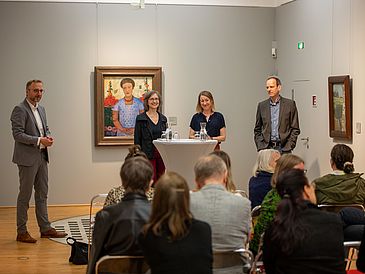From the Worpswede moors in Paula Modersohn-Becker's landscape painting to green spaces in today's Bremen city center: at first glance, the arc that was spanned on the third floor of the museum in Böttcherstraße on 16.05.24 seems wide. Under the title "Double Perspective Nature: Art and Health in Exchange", the Integrated Health Campus Bremen invited visitors to a new, unusual event format for the first time. From the perspective of art, Dr. Frank Schmidt, Director of the Paula Modersohn-Becker Museum, highlighted the significance of nature in the artist's paintings. Prof. Gabriele Bolte, Managing Director of the IPP and Head of the Department of Social Epidemiology, and Dr. Stefanie Dreger, lecturer and member of the IPP, presented the health science perspective on the role of nature for human health in a dialog: Especially in urban areas, the health-promoting effects of green spaces should not be underestimated. The mere sight of green and blue spaces, i.e. bodies of water, has a positive effect on mental health and can help to reduce stress. Parks, lakes, rivers and urban forests also invite people to go for walks, cycle, paddle or do other sporting activities and can therefore promote physical health as well as mental health: Among other things, physical activity strengthens cardiovascular health and reduces the risk of developing type II diabetes. Last but not least, publicly accessible green spaces offer space for encounters and social contact, but flora and fauna can also pose health risks. Poisonous plants, allergens or ticks that transmit diseases such as Lyme disease are just a few examples of health hazards that we can encounter in nature. The experts also emphasized new risks that climate change in particular poses to health. For example, increasing heatwaves endanger vulnerable sections of the population in particular, such as the elderly and/or people with pre-existing conditions, as well as babies and small children. However, nature can also help here: Green spaces form air corridors and can help cool down the city, trees become important sources of shade. The influence that the environment has on health is one of the core areas of expertise of the two scientists from the IPP's Department of Social Epidemiology, whose areas of focus include urban health (health in urban areas) and environmental justice in the context of health. The department has also been a "WHO Collaborating Centre for Environmental Health Inequalities" since 2019 and, in this capacity, advises the World Health Organization on topics relating to social inequality in the context of environment and health.
The lectures were followed by a discussion in the Paula-Modersohn-Becker Museum, in which the dual perspectives of art and science were expanded to include those of the audience, who discussed their own relationships to nature - whether in art or with regard to their health. Overall, the experimental format proved to be profitable: "The dialog between art and science was a new event format for us and a good further opportunity to bring our research topics out of the university and into the city," said Prof. Bolte after the event.
Autor: Maren Emde, University of Bremen
Coordinator
Research and transfer focus on health sciences,
Scientific focus Health Sciences
Contact:
Prof. Dr. Gabriele Bolte


